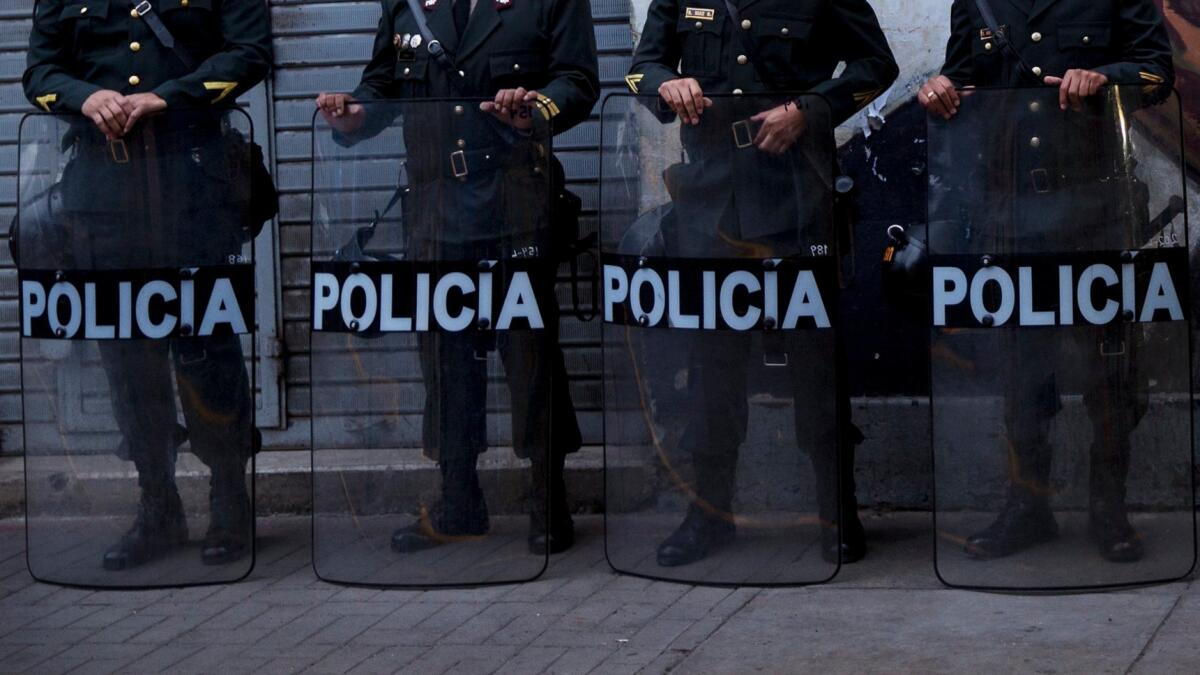Strong evidence suggests a Peruvian police ‘death squad’ set up and killed criminal suspects

- Share via
Reporting from Lima, peru — Nine members of Peru’s national police are being investigated on suspicion of participating in a “death squad” responsible for as many as 27 killings carried out to secure promotions and impress superiors, government officials said.
One police general, a commander and seven officers are suspected of having organized at least six bogus police operations from 2011 to 2015 that resulted in the deaths. While most of the victims had criminal pasts, at least 11 people killed during the operations had no police records, investigators say.
A source within a special investigative committee formed by recently inaugurated President Pedro Pablo Kuczynski told the Los Angeles Times late Tuesday that investigators believe corrupt police using intermediaries persuaded delinquents to carry out robberies and then killed them during the heists to gain performance points.
The source, who spoke on condition of anonymity because the investigation is ongoing, said the special committee’s report was given to the interior ministry’s special prosecutor for organized crime Tuesday night, but it still has not been made public.
The report recommends that the nine officers be suspended from duty until the prosecutor’s investigation is completed, the source said.
New interior minister and Kuczynski appointee Carlos Basombrio ordered the special committee investigation after the daily newspaper La Republica reported in July that 96 members of the national police were being investigated on suspicion of having been involved in extra-official executions of criminal suspects.
On Monday, interior Vice Minister Ruben Vargas told reporters that a “criminal group” had functioned within the national police as a “death squad on a national level” to commit “false positives,” or extrajudicial killings.
“There exists serious evidence that this irregular group … murdered delinquents in false operations,” Vargas told reporters. The same nine officers participated in each of the police actions under investigation, he said.
The special committee report singled out police Commander Enrique Prado as a prime suspect in organizing the death squad. It also said investigators were aided by police informants who told of civilian intermediaries being paid by the police to persuade criminals to commit “apparently easy” robberies against banks and businessmen.
The intermediaries would then tell police when the robberies were to take place so they could catch the suspects in the act and kill them in what seemed to be “risky confrontations.” The incidents occurred in Lima and several regions of the country.
Commander Prado “organized everything and gained a promotion and the congratulations from his bosses,” the informant told investigators.
Prado’s attorney, Isaac Nonalaya, denied that his client was responsible for the killings. Commenting to La Republica this week, Nonalaya accused the informants of acting on “economic need to make false accusations. My client is an honorable and irreproachable policeman.”
Special correspondent Leon is based in Lima. Special correspondent Chris Kraul in Bogota, Colombia, contributed to this report.
ALSO
As Venezuela’s farms and factories falter, the country struggles to feed its people
Grainy footage appears to show kidnapping of son of Mexican cartel leader ‘El Chapo’
More to Read
Sign up for Essential California
The most important California stories and recommendations in your inbox every morning.
You may occasionally receive promotional content from the Los Angeles Times.










